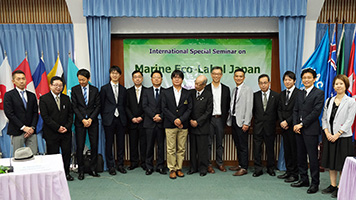 SEAFDEC, with support from the Japan Fisheries Association, organized the “International Special Seminar on Marine Eco-Label Japan” at the SEAFDEC Secretariat in Bangkok, Thailand on 26 November 2019. The Seminar was aimed at introducing and sharing the fishery eco-label initiatives in Japan, and discussing the possibilities of extending the concept of Marine Eco-Label Japan or MEL Japan and sustainability certification to Thailand as well as to the Southeast Asian region. Officials and staff from relevant governmental agencies, associations, academes, and private sectors in Thailand and Japan, as well as officials of SEAFDEC Secretariat and Training Department attended the Seminar.
SEAFDEC, with support from the Japan Fisheries Association, organized the “International Special Seminar on Marine Eco-Label Japan” at the SEAFDEC Secretariat in Bangkok, Thailand on 26 November 2019. The Seminar was aimed at introducing and sharing the fishery eco-label initiatives in Japan, and discussing the possibilities of extending the concept of Marine Eco-Label Japan or MEL Japan and sustainability certification to Thailand as well as to the Southeast Asian region. Officials and staff from relevant governmental agencies, associations, academes, and private sectors in Thailand and Japan, as well as officials of SEAFDEC Secretariat and Training Department attended the Seminar.
Recognizing the importance of sustainability of the marine resources for the future generations, the MEL Japan was developed in 2007 and has recently been benchmarked with the Global Sustainable Seafood Initiative (GSSI) standards. The scheme was adopted in Japan as means of providing information on fish catch throughout the value chain, i.e. from production sites to consumers, covering not only capture fisheries but also aquaculture. During the Seminar, several similarities of fisheries situation in Japan and Southeast Asian countries were reiterated, e.g. fisheries activities are undertaken mostly by small-scale fishers using small-sized fishing boats, activities at landing sites are labor intensive involving several middlemen, catches comprise diverse species, and so on, making certification schemes that may be applicable for large-scale/single-species fisheries elsewhere not applicable in this region. Moreover, the regional tool on enhancing traceability of fish and fishery products in the Southeast Asian countries, such as the ASEAN Catch Documentation Scheme, was also introduced during the Seminar.
 SEAFDEC Southeast Asian Fisheries Development Center
SEAFDEC Southeast Asian Fisheries Development Center